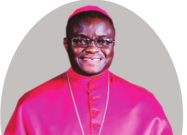‘THE WORD BECAME FLESH, HE LIVED AMONG US,
AND WE SAW HIS GLORY, Jn. 1:14’
‘Every year, the Gospel of the second Mass on Christmas day is the Prologue of St. John’s Gospel 1:1-18because it is a significant passage for the birth of Christ at Christmas.
‘Secondly, it reveals the nature and person of the child Jesus. It also enlightens us about his origins and mission and who is in relation to God, the Father and ourselves who believe in him as the only Son of God and Savior of humanity.
Unfortunately, many Catholics do not fully understand why this Gospel is read on Christmas day. For, it is neither, in their estimation, a familiar detailed account of Christ’s birth in Bethlehem like St. Matthew’s and St. Luke’s birth and infancy narratives, nor the best and most suitable text for the feast of Christmas. Both opinions on this text may be reasonable but they are inaccurate and misleading. For, there are significant and meaningful statements in this passage that reveal and summarize everything we need to know about the birth of Jesus, his identity, mission, presence on earth, and our faith in him as the Son of God and savior of humanity.
The child Jesus is identified in this passage as the Word who was with God and was God before he took flesh in the womb of the Virgin Mary. He is both God and man, in that sense, when he became flesh, lived among us, and revealed his glory as the glory of the only Son of the Father.
I will, therefore, reflect with you in my Christmas message on the relevance of St. John’s key statement in this passage that, “the Word became flesh, and he lived among us, and we saw his glory.”
We always recall and celebrate the birth of the child Jesus in Bethlehem at Christmas. The circumstances, conditions, and events of his birth are also remembered in our celebrations. But we do not always consider the mystery of the incarnation, that is, God-made-man as the main event the Church celebrates at the Annunciation and birth of Christ at Christmas.
When Mary gave birth to the child Jesus in a Manger at Bethlehem, God became man and he shared our human nature and became one like us. So, the child Jesus is both God and man, divine and human in nature, eternal and temporal in being.
He is the Son of God, at the same time, the Son of Mary when he was born at Bethlehem. God’s union with man in the child Jesus is, consequently, what the Church celebrates and proclaims at Christmas as the mystery of the incarnation.
St. John perfectly summarized this mystery the Church celebrates in Jn. 1:14. He said the Word of God became flesh, he lived among us and we saw his glory as the glory of the only Son of God. The mystery of the incarnation is, therefore, part and part of the feast of Christmas we should fully understand and appreciate.
As the Church testified in its Apostolic and Nicene Creeds, Jesus is both true God and true manso the mystery of the incarnation is very central to our Catholic faith and spiritual life as believers. St. John’s statement, therefore, reveals and justifies the mystery of the incarnation that the Church celebrates at Christmas.
We should equally recognize and affirm the divine and human natures of the child Jesus in our celebration of his birth at Christmas.
When God’s divine Word became man in the child Jesus, he emptied himself of his divinity and equality with the Father and assumed the conditions, limitations, and mortality of our human nature. He renounced his divine majesty and status and became like us in all things but sin.
So, the incarnate Word of God was truly human when he was born of the Virgin Mary and he experienced all the weakness, constraints, and natural dispositions of our human nature. He also shared our poverty, pain, and suffering as a child in Bethlehem.
His life on earth as a human person was, consequently, a life of humility, obedience, and self-denial. St. John’s testimony that the Word became flesh and lived among us is equally relevant because it affirms the humility, self-denial, and experience of Christ in his humanity.
We should, therefore, cherish the lowly and modest life of the child Jesus in Bethlehem based on St. John’s statement that the Word became flesh and he lived among us. For, it was in his material flesh and body that the divine Word and Son of God lived a life of humility, poverty, obedience, and service. We should equally be motivated and inspired to follow his example of modesty and self-denial that St. John affirms in this passage. Our attitudes, values, and interests in life should now be modeled on the human qualities of the child Jesus that we celebrate at his birth on Christmas.
Jesus revealed his glory as the incarnate Word of God and savior of humanity when he was born at Christmas. The feast of Christmas is not, in that case, a mere celebration of his birth. It is also a manifestation of his identify as God-with-us, as the redeemer of the human race from sin and death. This is not so prominent in our celebration of Christmas but it is an important aspect that the Church wants us to consider. Jesus revealed himself and his glory and St. John acknowledged it in Jn.1:14 that the “Word became flesh, he lived among us, and we saw his glory as the glory of the only Son of God.” Both his birth and manifestation were, therefore, presented and affirmed in this text.
St. John’s testimony is, therefore, important for the Church because it presents both aspects of Christmas that we are required to believe and cherish in our liturgical and festive celebrations of this event of our salvation.
So, we are not just expected as usual to celebrate the birth of Christ at Christmas. We are also required, like St. John, to recognize and bear witness to his glory he manifests in our midst as the Son of God. He will reveal his light and glory to our sinful world as he did when he was born in Bethlehem and it will be reflected throughout the world. But we have to see and believe with our eyes of faith the glory and light of the child Jesus he shed sin our hearts and minds and our society and world today.
Another important reality the Church wants us to recognize and understand as we celebrate Christmas is the child Jesus lives among us in our homes, communities, and society. The eternal Word of God did not only become a human being like us, he also lives among us in our various vocations and conditions in life.
He was identified in St. Matthew’s account as God-with-us but St. John specifically stated that the incarnate Word of God lives amongst us. His true and personal presence in our midst was, therefore, emphasized and acknowledged by St. John more than St. Matthew’s reference to Jesus as God-with-us.
We should not, for that reason, discount or disregard his living presence among us when we celebrate and enjoy the feast of his birth at Christmas. For, he lives and dwells among us as the incarnate Word of God.
We should, therefore, be open and eager to encounter, experience, imitate, and obey him in our daily lives. Otherwise, our celebration of the feast of Christmas will be meaningless and useless if we are not fully conscious of his abiding presence in our midst; if our lives are not also influenced and transformed by his presence in our homes and society.
So, the temptation and tendency of celebrating the birth of Jesus at Christmas without any concern or awareness of his living and saving presence on earth should never be tolerated or entertained. Nothing should, therefore, distract our attention from the child Jesus’ living presence among us when we celebrate his birth at Christmas.
If we consider the origin, identity, manifestation, presence, and mission of the child Jesus in this text the Church always presents on Christmas day, we will be enlightened and inspired to renew and reaffirm our faith in him as the Son of God and our Lord and Savior.
We will not have any doubt about his divine power as the incarnate Word of God. We will also not question or wonder about his presence and solidarity with us in our various situations and vocations in life.
For, St. John fully explained the origins of the child Jesus as God’s Word and he also recognized and affirmed his living presence and glory among God’s people. He testified that, the “Word became flesh, he lived among us, and we saw his glory as the glory of the only Son of God.”
This statement clearly explains and justifies what the Church celebrates at Christmas as the birth of Christ and the manifestation of his glory on earth. For that reason, the Church presents the Prologue of St. John’s Gospel as the Gospel passage of the second mass on Christmas day for us to believe in Jesus as the Son of God sent to redeem the world and humanity from sin and death. So, the birth of Jesus at Christmas is an occasion for us to confess and reaffirm our faith and hope in him as our Lord and Savior.
We will then experience his peace, power, and deliverance in our lives if we believe in him as the incarnate Word of God. As St. John stated in Jn. 1:11-12, Jesus came to his own domain and his own people did not accept him but to all who accepted and believed in him, he gave power to become children of God.He will equally restore our identity and dignity as God’s children if we have faith in him as the Son of God.
The choice of St. John’s Gospel reading on Christmas day should now be understood and appreciated by all who celebrate the birth of the child Jesus. Our celebration of his birth should also be meaningful, joyful, and relevant for us because, “the Word of God became flesh, he lived among us, and we saw his glory as the glory of the only Son of God.”
The incarnate Word of God now lives among us in our homes, society, nation, and world at large so the mystery of the incarnation of God’s Son directly concerns us. The Son of God now dwells in our midst in solidarity with us in our various conditions and vocations in life.
We should equally have more reason to celebrate his birth with joy, gladness, conviction, and hope. So we need to reflect more on this Gospel passage and its message and be open to encounter, experience, and be inspired by the child Jesus, the Incarnate Word of God now present among us. As we celebrate his incarnation, nativity, and presence among us, I wish all the priests, religious, deacons, seminarians, lay faithful of the Diocese of Banjul, our brothers and sisters in Christ, Muslim believers, believers of other faiths, and all Gambians at home and abroad a joyful, peaceful, meaningful, and blessed feast of Christmas.
May we all experience in our lives the peace, power, and redemption of the Son of God and our Lord and Savior Jesus Christ. Amen
Your’ Servant in Christ,
Most Rev. Dr. Gabriel Mendy; C.S.Sp.
Catholic Bishop of the Diocese of Banjul, The Gambia.






















